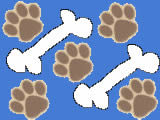Problem Solving For Biting
PROBLEM SOLVING
An important part of pet ownership is teaching your puppy or dog proper pet manners and bite inhibition. It is your responsibility to have control over your dog at all times and to correct any bad behavior as it begins to happen. Your pet should never be left outside unattended and you should always obey leash laws. Dog obedience training is an important factor in the process of raising a good canine citizen. Knowing a few simple commands, such as paying attention to you, ignoring distraction and to come when called, could save you from unnecessary law suits. Some of these corrections should begin when your dog is a puppy, and even before he is leash trained, while other corrections may require a leash and collar. Remember, your puppy or dog is like a small child. He might misbehave due to curiosity, boredom or being agitated not because he knows what he’s doing is unacceptable. Remember, with most unacceptable canine behaviors, bite prevention is much easier than treatment.
To correct biting behavior problems, step in and interrupt at the eariest possible moment and follow these basic steps:
- Interrupt the growl and get your puppy or dog’s attention using a low-pitched, stern voice saying “No!” or “Ahh!” to stop the behavior.
- Provide an acceptable alternative behavior or distraction, like sit and stay, and pay attention to you and ignore what ever they where growling at.
- Praise the sit - stay and attention behavior in a happy voice (“Good dog!”) and pet him or give treats.(If your dog or puppy is unable to ignore the distraction move further away)
GROWLING and BITING –
Most dogs that bite began as growling puppies that were never corrected. Then came snapping and when they got away with that, they started biting. Usually, once a dog has learned to bite a human, he can no longer be trusted. The solution is to prevent this behavior from starting.
When a puppy first begins to growl, put him on leash and jerk the leash saying, “No.” Then praise him calmly when he stops. A puppy may nip at you while playing. He doesn’t understand that his biting is painful. When he bites, give his leash a corrective jerk and say “No.” Then slowly resume play.
If he continues to nip at you, stop playing and ignore him.
Through repetition, he will learn that every time he bites, he loses his playmate and that ends the fun.
Do not allow your puppy or dog to bite or chew on your hands, and avoid playing aggressive games such as tug of war.
If your dog exhibits dangerous behavior toward any person, particularly children, seek professional help from a qualified trainer.






